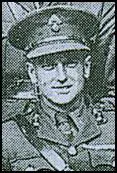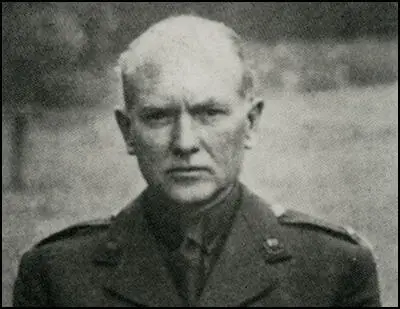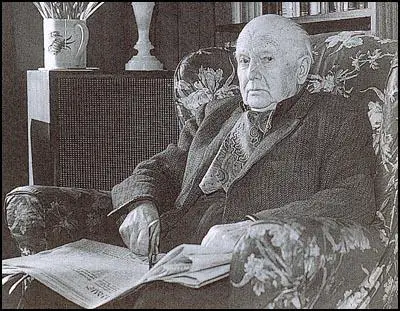Guy Chapman

Guy Chapman, the son of a wealthy barrister, G. W. Chapman, was born in London in on 11th September 1889. He was educated at Westminster School, Christ Church College (1908-11) and the London School of Economics before becoming a lawyer in 1914. Later that year Chapman married Doris May Bennett at Kensington Register Office.
On the outbreak of the First World War, Chapman joined the Royal Fusiliers as a junior officer. He later wrote: "I was loath to go. I had no romantic illusions. I was not eager, or even resigned to self-sacrifice, and my heart gave back no answering throb to thought of England. In fact, I was very much afraid; and again, afraid of being afraid, anxious lest I show it." Chapman was not impressed by the quality of his training: "The ten months' training, which the battalion went through before it reached France, was therefore a compound of enthusiasm and empiricism on the part of the junior subalterns and the other ranks. We listened hopefully to the lectures of general officers who seemed happier talking of Jubulpore than of Ypres. We pondered the jargon of experts, each convinced that his peculiar weapon, machine-gun, rifle, bayonet, or bomb, was the one designed to bring the war to a satisfactory conclusion."
Chapman arrived on the Western Front in August 1915. He was appalled by the state of the trenches. "The trench was not a trench at all. The bottom may have been two feet below ground level. An enormous breastwork rose in the darkness some ten or more feet high. All about us there was an air of bustle. Men were lifting filled sandbags on to the parapet and beating them into the wall with shovels. Bullets cracked in the darkness. Every now and then a figure would appear on the skyline and drop skillfully on the firestep."
Chapman also found the mud a serious problem: "Rain had made our bare trenches a quag, and earth, unsupported by revetments, was beginning to slide to the bottom. We hailed the first frost which momentarily arrested our ruin. Saps filled up and had to be abandoned. The cookhouse disappeared. Dugouts filled up and collapsed. The few duckboards floated away, uncovering sump-pits into which the uncharted wanderer fell, his oaths stifled by a brownish stinking fluid."
In the summer of 1916 Chapman took part in the Battle of the Somme. He found that the morale of his men suffered after the offensive failed to break-through the German front-line: "The men, though docile, willing, and biddable, were tired beyond hope. They lived from hand to mouth, expecting nothing, and so disappointed nowhere. They were no longer decoyed by the vociferous patriotism of the newspapers. They no longer believed in the purity of politicians or the sacrifices of profiteers. They were fed up with England as they were with France and Belgium. The best they could count on was a blighty, a little breathing space to stretch their legs and fill their lungs with sweet air."
After surviving the Battle of Arras in 1917, Chapman was badly affected by a mustard-gas attack. "The Boche dropped half a dozen mustard-gas shells round headquarters. I had heard them, but since I had smelt nothing had neglected to put on my gas-mask. Now my eyes had begun to run, and as soon as I opened them fountains of water gushed down my cheeks. Doctor Toulson washed them and washed them. It was no use. The flood continued." After treatment he returned to the Western Front and was still there when the Armistice was signed in 1918.
Chapman was demobilised in February 1920, with the rank of major. After divorcing his wife he got a job as manager for a new London branch of an Irish publishing firm, Chapman and Dodd, in Denmark Street, Soho. In January 1924 the writer, Storm Jameson, came to the office. Chapman later commented: "She was wearing a heavy coat over a faded pink knitted dress, and a hat which did not suit her, and she smiled at me. She was rather lovely, with long cool grubby fingers, and she held herself badly: she made me think of a well-bred foal, unbroken and enchantingly awkward. Something she said at that first meeting, I forget what, made me laugh with pure pleasure."

They soon began a relationship. The couple married on 1st February 1926. Later she wrote: "We went to places, obscure ruined monasteries, small provincial art galleries, the house in which a dead philosopher spent his life, salt marshes, trout streams, some turn in a rough nameless road which offered a view of a smiling valley and a line of hills, because, although he had not seen them, he knew they were there. He made all other company a little dull."
Chapman became a university lecturer and eventually became Professor of Modern History at the University of Leeds (1945-53). He published several books including an account of his wartime experiences, A Passionate Prodigality (1933). He also edited two important collections of prose from the war, Fifty Amazing Stories Of The Great War (1936) and Vain Glory (1937).
Other books by Guy Chapman include Culture and Survival (1940), Beckford (1952), The Dreyfus Trials (1955), The Third Republic of France (1962) and Why France Collapsed (1968).
After his death on 30th June 1972, his wife, Storm Jameson, edited A Kind of Survivor (1975), a selection of Chapman's autobiographical writings.

Primary Sources
(1) On the outbreak of the First World War Guy Chapman decided to join the Royal Fusiliers.
I was loath to go. I had no romantic illusions. I was not eager, or even resigned to self-sacrifice, and my heart gave back no answering throb to thought of England. In fact, I was very much afraid; and again, afraid of being afraid, anxious lest I show it.
The ten months' training, which the battalion went through before it reached France, was therefore a compound of enthusiasm and empiricism on the part of the junior subalterns and the other ranks.
We listened hopefully to the lectures of general officers who seemed happier talking of Jubulpore than of Ypres. We pondered the jargon of experts, each convinced that his peculiar weapon, machine-gun, rifle, bayonet, or bomb, was the one designed to bring the war to a satisfactory conclusion.
(2) Guy Chapman, A Passionate Prodigality: Fragments of Autobiography (1933)
The communication trench was just wide enough to accommodate a man with a full-pack, and about seven feet deep, so that one's vision was limited to a patch of darkening sky and the shoulders of the man in front. Its floor was covered with a foot of tensely glutinous mud. We drove slowly through the morass, wrenching out each foot before putting it down again.
Darkness fell. After what seemed half a night, the guide stopped and said: "There's a road here. See and hurry over it. There's a machine gun on it. See? One at a time."
We tore ourselves singly from the mud and bundled on to the road, diving towards a dark opening in the other bank. The machine gun threw a few desultory shots past us. The bullets cracked sharply overhead. We tumbled into another trench and went on. This one was narrow, too, but shallower and duck-boarded. We moved more quickly. We could see lights raising and falling in front of us, and the noises interpreted themselves as rifles and machine guns firing.
Suddenly someone said: "Hullo," and Smith, my company commander, loomed up. "Is this the front line? I asked. "That's it."
(3) Guy Chapman, A Passionate Prodigality: Fragments of Autobiography (1933)
The trench was not a trench at all. The bottom may have been two feet below ground level. An enormous breastwork rose in the darkness some ten or more feet high. All about us there was an air of bustle. Men were lifting filled sandbags on to the parapet and beating them into the wall with shovels. Bullets cracked in the darkness. Every now and then a figure would appear on the skyline and drop skillfully on the firestep.
"Care to see the wire?" said my guide. I followed him gingerly over the edge of the wall, and slid clumsily down a ramp of greasy sandbags. A small party was working swiftly over a tangle of some dark stuff. Two of my own soldiers were being inducted into the ceremony of wiring. "Hold it tight, chum," growled one figure. He proceeded to smite a heavy bulk of timber with a gigantic maul, the head of which had been cunningly muffled in sandbags.
(4) Guy Chapman, A Passionate Prodigality: Fragments of Autobiography (1933)
My dugout, a hole ten feet deep into the red soil, roofed with five layers of logs, was shared by our machine-gun officer, Batty-Smith. He was the youngest of us all and by far the most cheerful. We used to lie on our bunks in that afternoon hour of rest before stand-to, and Batty, his smooth cheeks quivering with mirth, would sometimes read an absurd letter from a brother, a prisoner in a camp in Germany.
(5) Guy Chapman, A Passionate Prodigality: Fragments of Autobiography (1933)
One morning, while I was inspecting the rifles of the sentries on duty, I was startled, not to say alarmed, by three whizz-bangs bursting as it seemed all round my head. I heard one coming very close, caught a glimpse of it out of the tail of my eye, and at that moment slipped. I picked myself up, but before I could reach my full height, the minnie burst. A furious hot whirlwind rushed down, seized me and flung me violently back against the earth. I lay half-stunned while a rain of earth and offal pattered down on me, followed by something which whizzed viciously and stuck quivering in the trench wall; it was a piece of jagged steel eighteen inches long.
(6) In the 1930s Guy Chapman wrote an account of his experiences during the First World War.
I have an old platoon roll before me; three pages of names, numbers, trades, next-of-kin, religions, rifle numbers, and so forth. Faces come back out of the past to answer to these barren details, the face of this man dead, of that vanished for ever. Here and there rise memories of their habits, their nicknames, the look of one as he spoke to you, the attitude of another shivering in the night air, as he leaned over the parapet, watching with tired bloodshot eyes. Some of the faces have disappeared. Did I know you? I censored your letters, casually, hurriedly avoiding your personal messages, your poignant hopes.
(7) Guy Chapman, A Passionate Prodigality: Fragments of Autobiography (1933)
Rain had made our bare trenches a quag, and earth, unsupported by revetments, was beginning to slide to the bottom. We hailed the first frost which momentarily arrested our ruin. Saps filled up and had to be abandoned. The cookhouse disappeared. Dugouts filled up and collapsed. The few duckboards floated away, uncovering sump-pits into which the uncharted wanderer fell, his oaths stifled by a brownish stinking fluid.
(8) Guy Chapman sent out a raiding patrol on the Western Front in June, 1916.
Our raiding party crept out from the company line and waited for the artillery to finish the breaking of the wire. A wind had risen during the afternoon and was now blowing across the front. The trench mortar fired; but the registration had been carried out when there was no wind. The breeze caught the bomb, carried it down the line. It exploded a few yards from the attacking group.
Gwinnell staggered up, with three wounds in the leg, Perkins hit in both arms; but Batty lay still. A splinter had gone straight through his brain. Eight other men were hit, and there was no more to be done with the raid. Gwinnell, bleeding from his wounds, shepherd the man back and brought in Batty's body.
The catastrophe wrenched many of us as no previous death had been able to do. Those we had seen before had possessed an inevitable quality, had been taken as an unavoidable manifestation of war. But this death, at the hands of our own people, through a vagary of the wind, appeared some sinister and malignant stroke, an outrage involving not only the torn body of the dead boy but the whole battalion.
(9) One of Guy Chapman's company, Private Turnbull, was arrested for a self-inflicted wound.
I glanced down the casualty reports. One name stood out above all others. "Private Turnbull, S.I.W." A bullet fired deliberately at the foot was the only way out. Perhaps those who call this man a coward will consider the desperation to which he was driven, to place his rifle against the foot, and drive through the bones and flesh the flames if the cordite and the smashing metal. Let me hope that the court-martial's sentence was light. Not that it matters, for, in truth, the real, the real sentence had been inflicted long ago.
(10) Guy Chapman, A Passionate Prodigality: Fragments of Autobiography (1933)
Our dugout, a cellar at the trench corner, was not gas-proof nor had it much head cover. Rats, great beasts as big as kittens, which ran to and fro over the parapets and squeaked behind the boards in the dugout shafts. Dell was their deadly enemy. With an "Excuse me, sir," he would brush by me and lunge with his bayonet at a scurrying shadow. Not infrequently, he would turn back to me waving a struggling trophy, which torchlight revealed as the scrofulous and mangy progenitor of vast litters, now, gorged on French corpses and offal, too obese to move with the slippery agility of the young fry.
(11) In his book, A Passionate Prodigality: Fragments of Autobiography, Guy Chapman described a discussion between two junior officers in a dugout at the Western Front.
"Do you remember a corporal with the Messina medal?"
"Oh, yes; a dark stocky man."
"He went off with an officer we'd caught. Presently I found him back in the trench. I knew he couldn't have got down to the cage and back; so I asked him what had happened. "Well, sir," he said, "it's a very hot day. We sat down in a shell hole and he gave me his watch and his field-glasses and his money. It's very hot day and a long way down. So I shot him."
"What did you do?" "There wasn't any need to do anything," said Vaughan with a curl of his thin lips; "he was killed that afternoon."
(12) Guy Chapman, A Passionate Prodigality: Fragments of Autobiography (1933)
The enemy were attacking under cover of flammenwerfer, hose pipes leading to petrol-tanks carried on the backs of men. When the nozzles were lighted, they threw out a roaring, hissing flame twenty to thirty feet long, swelling at the end to a whirling oily rose, six feet in diameter. Under the protection of these hideous weapons, the enemy surrounded the advance pill-box, stormed it and killed the garrison.
(13) In his book, A Passionate Prodigality: Fragments of Autobiography, Guy Chapman described the disillusionment felt after the Battle of the Somme.
The men, though docile, willing, and biddable, were tired beyond hope. They lived from hand to mouth, expecting nothing, and so disappointed nowhere. They were no longer decoyed by the vociferous patriotism of the newspapers. They no longer believed in the purity of politicians or the sacrifices of profiteers. They were fed up with England as they were with France and Belgium. The best they could count on was a blighty, a little breathing space to stretch their legs and fill their lungs with sweet air.
(14) In 1917 Guy Chapman was badly affected by a mustard-gas attack.
The Boche dropped half a dozen mustard-gas shells round headquarters. I had heard them, but since I had smelt nothing had neglected to put on my gas-mask. Now my eyes had begun to run, and as soon as I opened them fountains of water gushed down my cheeks. Doctor Toulson washed them and washed them. It was no use. The flood continued.
(15) Guy Chapman, A Passionate Prodigality: Fragments of Autobiography (1933)
Our newspapers told us that the evangelists of the new world were stumping England with their holy doctrines of "Hang the Kaiser" and "Squeeze Germany until the pips squeak." The voting papers which this honest ministry sent us arrived a week after the election had taken place. Perhaps the rest of the army were equally well served. I can conceive no other explanation of the return of the Coalition.
(16) Guy Chapman, A Kind of Survivor (1975)
She was wearing a heavy coat over a faded pink knitted dress, and a hat which did not suit her, and she smiled at me. She was rather lovely, with long cool grubby fingers, and she held herself badly: she made me think of a well-bred foal, unbroken and enchantingly awkward. Something she said at that first meeting, I forget what, made me laugh with pure pleasure.
(17) Storm Jameson, quoted in A Kind of Survivor (1975)
We went to places, obscure ruined monasteries, small provincial art galleries, the house in which a dead philosopher spent his life, salt marshes, trout streams, some turn in a rough nameless road which offered a view of a smiling valley and a line of hills, because, although he had not seen them, he knew they were there. He made all other company a little dull.


